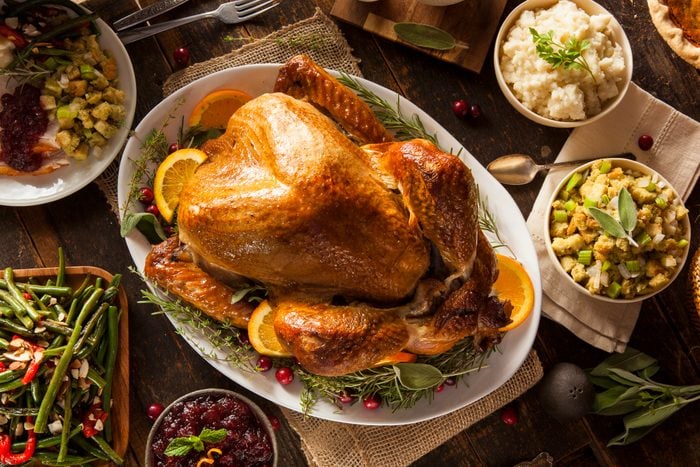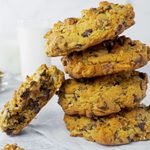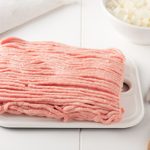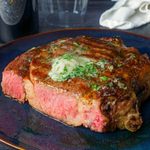Why Does Turkey Make You Sleepy?

It's time for the annual late afternoon nap in front of the football game! Yes, turkey makes you sleepy—but it's not the only culprit at your Thanksgiving table.
Pull out your stretchy pants and stake out a post-dinner spot on the couch. It’s time for Thanksgiving! Most of us are used to feeling sleepy after this annual feast. You may have heard that the tryptophan in turkey is what makes us sleepy, but that’s only part of the story.
Here’s how to cook your turkey step-by-step.
Does turkey make you sleepy?
Turkey contains an amino acid called tryptophan, and this protein building block is usually blamed for the post-dinner nap on Thanksgiving. Tryptophan helps our bodies to make serotonin, the feel-good hormone. Serotonin makes us feel more relaxed and happy.
This process also releases melatonin into the blood. Melatonin is a hormone that causes us to feel drowsy. Our bodies usually release it in the evening once it starts getting dark out.
It’s possible that tryptophan contributes to your sleepiness on Thanksgiving but it’s not the whole picture. Other protein sources like chicken, fish and eggs contain similar amounts of tryptophan.
What’s the real reason you get drowsy on Thanksgiving? It’s not so much what you eat, but how much you eat.
What else makes you feel tired post-Thanksgiving feast?
The main culprit? It’s likely a simple case of overeating (we’ve all been there).
Thanksgiving dinner often involves a variety of tasty carbohydrates like potatoes, dinner rolls, sweet potatoes and (if you’re lucky) creamy mac and cheese. Meals that are rich in carbs and fats tend to make us feel sleepy about an hour to an hour and a half after eating. Consuming carbs also helps your body fall asleep faster.
When our bodies take in a high number of calories, they respond by releasing a chemical called cholecystokinin (CCK). CCK acts as a “fullness” signal to your brain, telling you that you’ve had enough and it’s time for a break. It’s possible that CCK also causes you to feel sleepy.
If you add in dessert and a Thanksgiving drink, then you have a recipe for a snooze in front of the football game. Sweet foods like pumpkin pie or pecan pie bars cause our blood sugar levels to spike, leading to a crash later. And alcohol also contributes to our sleepiness because it acts as a depressant for the body.
Bottom line: It’s natural to have heavy eyelids after a heavy holiday meal.
What are the best things to do after a large meal?
Fortunately, there are small steps that you can take to feel more awake and ready to chat after Thanksgiving dinner.
Start by arriving at your Thanksgiving gathering well-rested. This is a marathon, so prep for the big day by getting enough sleep, around 7 to 8 hours each night. It’s also helpful to have a regular exercise practice in place as physical activity can be energizing.
When it’s time for the main event, consider eating smaller portions if you’d like to avoid the post-dinner crash. You don’t have to give up mashed potatoes or sweet potato pie. Just enjoy them slowly and stop when you feel full. Drinking alcohol will always lead to feeling sleepy, so consider switching to water for your dinnertime drink.
After dinner, head outside for a group walk or touch football game. Moving your body can help you feel more alert. You may want to sneak in a bit of movement between dinner and dessert to give your digestive system a break.
Most importantly, take time to enjoy the day and the people you’re with. Savoring a good meal with friends and family might be worth a little afternoon sleepiness.



